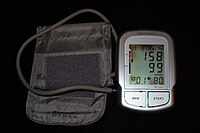
Photo from wikipedia
To identify regional cerebral blood flow (rCBF) alterations in children and adolescents with congenital heart disease (CHD) in relation to neurocognitive outcomes using a non-biased data-driven approach. This is a… Click to show full abstract
To identify regional cerebral blood flow (rCBF) alterations in children and adolescents with congenital heart disease (CHD) in relation to neurocognitive outcomes using a non-biased data-driven approach. This is a prospective, observational study of children and adolescents with CHD without brain injury and healthy controls using pseudo-continuous arterial spin labeling (pCASL) MRI. Quantitative rCBF was compared between participants with CHD and healthy controls using a voxel-wise data-driven method. Mediation analysis was then performed on a voxelwise basis, with the grouping variable as the independent variable, neurocognitive outcomes (from the NIH Toolbox Cognitive Battery) as the dependent variables, and rCBF as the mediator. After motion correction, a total of 80 studies were analyzable (27 for patients with CHD, 53 for controls). We found steeper age-related decline in rCBF among those with CHD compared to normal controls in the insula/ventromedial prefrontal regions (salience network) and the dorsal anterior cingulate and precuneus/posterior cingulate (default mode network), and posterior parietal/dorsolateral prefrontal (central executive network) (FWE-corrected p < 0.05). The reduced rCBF in the default mode/salience network was found to mediate poorer performance on an index of crystallized cognition from the NIH Toolbox Cognitive Battery in those with CHD compared to controls. In contrast, reduced rCBF in the central executive network/salience network mediated reduced deficits in fluid cognition among patients with CHD compared to controls. Regional cerebral blood flow alterations mediate domain-specific differences in cognitive performance in children and adolescents with CHD compared to healthy controls, independent of injury, and are likely related to brain and cognitive reserve mechanisms. Further research is needed to evaluate the potential of interventions in CHD targeting regional cerebral blood flow across lifespan.
Journal Title: Seminars in thoracic and cardiovascular surgery
Year Published: 2021
Link to full text (if available)
Share on Social Media: Sign Up to like & get
recommendations!